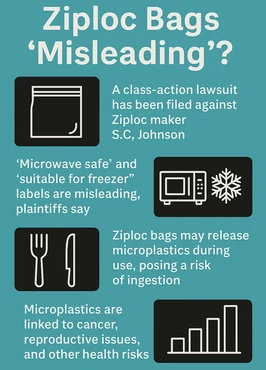Ziploc bags falsely claim to be safe for microwave and freezer use, the suit alleges
May 12, 2025
- A class-action lawsuit alleges that Ziploc bags falsely claim to be safe for microwave and freezer use.
-
The suit contends these claims mislead consumers, potentially exposing them to harmful microplastics.
-
Plaintiffs say Ziplocs parent company, S.C. Johnson, failed to disclose health risks associated with polyethylene and polypropylene.

S.C. Johnson & Son, the manufacturer of Ziploc bags, is facing a class-action lawsuit that accuses the company of misleading consumers about the safety of its popular food storage products. Filed in California on April 25 by lead plaintiff Linda Cheslow, the lawsuit targets claims that Ziploc bags are “microwave safe” and “suitable for freezer use.”
Cheslow alleges these statements are deceptive because the bags are made from polyethylene and polypropylene plastics that, according to the complaint, release harmful microplastics when heated or frozen. The lawsuit includes all others similarly situated, effectively representing any consumer who has used Ziploc bags under the belief they are safe for such purposes.
‘Fundamentally unfit’
The core issue centers on the risk of microplastic contamination during everyday use. Scientific and medical evidence shows [these materials] release microplastics when microwaved and frozen, the lawsuit states, arguing the bags are fundamentally unfit for the very uses they advertise.
Microplastics tiny particles smaller than 5 millimeters are increasingly found in water, food, and even human blood. Early research has linked them to serious health issues, including hormone disruption, cancer, and cognitive decline.
The suit claims that by marketing Ziploc bags as microwave- and freezer-safe, S.C. Johnson lulled customers into a false sense of security, increasing their risk of exposure.
Consumers and environmental advocates say the case highlights the urgent need for stricter labeling and reduced reliance on single-use plastics. In the meantime, experts recommend switching to reusable alternatives like glass containers to minimize health risks and environmental harm.
#Ziploc #didn039t #disclose #microplastic #exposure #risk #class #action #claims